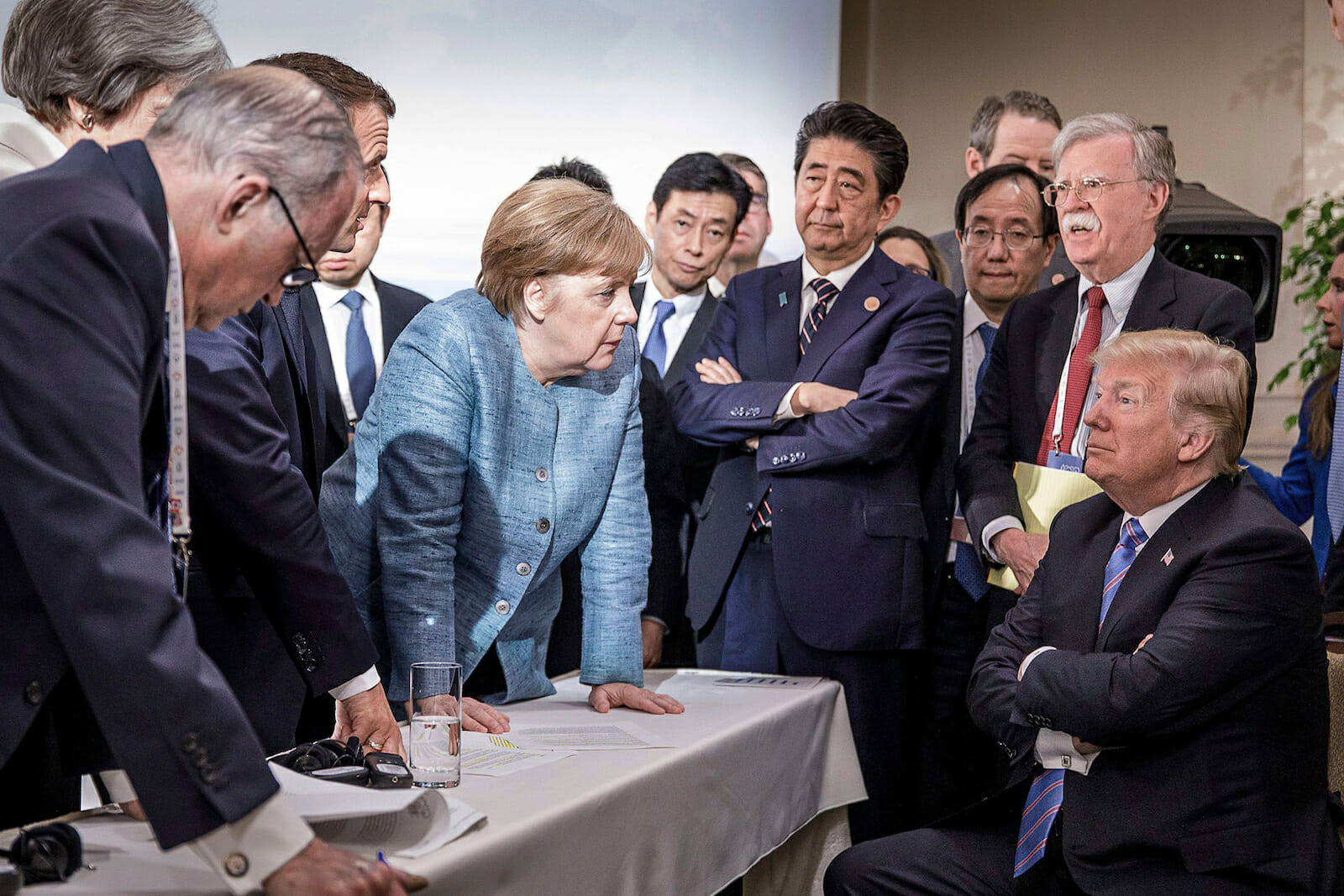
The Trump Presidency and Foreign Policy
Often the best predictor of a new US president’s foreign policy is to look at his predecessor. The strength and bipartisan nature of the American foreign policy establishment since World War II generally assures consistency and continuity across presidential administrations.
Yet every president leaves an imprint on foreign policy. For Barack Obama it was the Asian pivot, George Bush the War on Terror, Bill Clinton the Middle East Peace (Oslo) Accords, and George H. W. Bush the first Gulf War. But what is Trump’s foreign policy imprint or doctrine? Pejoratively the media recounts an official who declares it to be “We’re America, bitch,” but is there something more coherent or deeper than this phrase that has been designed or emerged? Despite skeptics who argue that the Trump doctrine is one of incoherence and whim, a Trump doctrine has actually emerged, based on Trump’s own sense of how to do business as a dealer. Trump’s world view shares some characteristics of his predecessors yet also it leaves a unique imprint which impact has already changed–for good or bad–American foreign policy and world politics.
American foreign policy since the end of World War II has rested on three pillars. The first has been military and nuclear superiority. Throughout the Cold War and after, the goal has always been to maintain a military strength sufficient to deter communism, defend the free world or democracy, fight two wars, deter nuclear war, or lead the fight against the war on terrorism.
The second pillar has been diplomacy. Diplomacy is broader than simply setting up ambassadorships, it is negotiating treaties and alliances that are often multilateral. It is creating rules for international trade and dispute resolution and constructing the framework for what Henry Luce called the emergence of the “American Century.” Diplomacy is about using American soft power to create a world hospitable to US interests, including democratic and free market values. Soft power also includes cultural values and ideas. In many ways, American culture and values–perhaps the Hollywoodization of the world–is the single greatest export of the United States and it is a valuable tool that affects public opinion across the world.
The third pillar is economics. The US maintained the largest economy in the world and its sheer size gave it muscle across the globe. American capitalism, coupled with it diplomatic skills in forging free trade and other economic agreements, fashioned a world where America dominated. It may not have been the case that the US had a positive trade balance with every nation, but collectively the economic world order formed after WW II favored the United States, making it the most prosperous nation on Earth.
Collectively these three pillars were an “America first” doctrine. Yet how American first was defined meant that the US would pursue its interests across these three pillars not just in the short but long term. It was also a foreign policy that was statist; in that it was built on crafting alliances with specific states and not specific regimes nor leaders. US interests were best preserved by forging relationships with strategic countries, often without regard to who was leading them. Finally, the US would seek to leverage overall world influence through bi- and multilateral agreements and alliances, and that it would cooperate with other states as part of a broader strategy to maintain US supremacy across the world.
These three pillars defined an America first foreign policy that held together the US foreign policy establishment across presidential terms since the 1940s. Yes each president would change it to adapt to evolving world conditions such as the end of communism, the rise of terrorism, or the emergence of China and Asia as major economic players. But collectively no post World War II president has rejected the basic goals or pillars that forge US foreign policy strategy.
The Trump presidency displays continuity and discontinuity. No debate that he buys into America first, this after all is what “Make America Great” is about. But his sense of how to secure America’s interesst is different from recent presidents in several ways–it is short term, personal, bilateral, and de-emphasizes diplomacy and soft power.
Trump agrees with the two pillars of military superiority and economic nationalism, but he applies, especially the latter, in ways that are unique from recent presidents. Specifically, he views economics not collectively in terms of how the US does overall, but evaluates US relationships on a bilateral county-by-county basis. Trump appears to want to win every negotiation and views any situation where a country has a positive balance of trade with the US as an unfair agreement. He seems to think that the US needs to export more goods than import from every country. Of course, such an approach fails to appreciate the economics of international trade and comparative advantage. Second, Trump does not like multinational trade deals and prefers to do one on one. This suggests that he does not see linkages across issues or how international economics or politics is more than bilateral or how in many cases, a deal with one nation is connected to another.
For example, his actions with North Korea (DPRK) and halting the military exercises fail to appreciate the concerns of domestic security for South Korea, and on any deal with the DPRK is connected to regional issues that involve also China and Japan. Economically, all relationships with a Trump foreign policy are zero-sum games. By that, Trump expects the US to win individual state/America deals. No country–including allies–seems to be given any preference.
Trump’s foreign policy does break with the third pillar-diplomacy and soft power. Trump’s focus is simply not on using it or any form of soft power when it comes to furthering US interests. With both friends and foes he has a bullying approach. Trump is also not interested in furthering human rights and democracy and he seems to like autocratic leaders. His foreign policy is personal, as with Kim Jong-Un of North Korea, and not statist. His preference for the art of the deal is based on traditional theories of business negotiations that stress the personal. And like many business deals, they are discretely transactional and not necessarily part of building longer term relations. Yet despite Trump’s not emphasizing soft power, the US still commands a presence in the world and its actions as well as that of its presidents send cultural signals and messages across the world.
What does all this mean for US foreign policy? Trump has already made an impact. He has pulled the US out of the Paris Accords, the Iran Nuclear Agreement, the Trans Pacific Partnership, and the U.N. Human Rights Council. Look to see the US exit or weaken other multilateral agreements /alliances over the course of the rest of the Trump presidency. Second, Trump’s rejection of soft power, diplomacy, and human rights parallels and enables the erosion of democratic norms across the world that groups such as Freedom House have recently documented. Third, his economic bilateralism will continue to spark trade wars and economic sanctions among the US and its partners. Fourth, his bilateralism, short- term, winner-take-all approach will challenge the basic world order that the United States has created for itself over the last 70 years. Perhaps this was a world order already collapsing for many reasons, but Trump’s foreign policy does little to construct a larger world order over the long term that favors America’s longer term interests or builds alliances favorable to American interests. Pulling out of so many multilateral agreements opens a void for other states such as China to fill. America was powerful because it was a player, it was always there and did not take the ball and bat and go home.
None of the above seems likely to help sustain or create “America’s second century” or make it great again. Yet this is what the Trump doctrine is doing. Faced with major challenges in the world, Trump’s foreign policy is not so much that of a dominant and ascending power, but one of a diminishing power, limiting its influence and range which characterized the last 70 years. Maybe it is impossible for the US to maintain the hegemony it enjoyed since WW II, and if so, maybe the Trump doctrine recognizes that, or alternatively, it hastens the commencement of a world where that is true.

